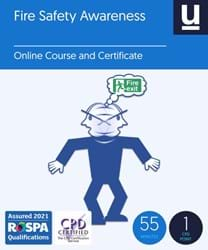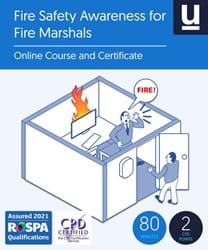
Fire safety is a critical concern, as it protects human lives and property worth billions of pounds. That's why the role of a fire marshal is crucial. A fire marshal or warden ensures all fire safety procedures and regulations are followed.
One of the critical responsibilities of a fire marshal is to conduct regular inspections of buildings and premises to identify potential fire hazards. They examine everything from electrical equipment to fire extinguisher equipment. By doing so, they aim to prevent the risk of fire and implement protective measures.
Having designated fire marshals within a business is essential, as they play a vital role in promoting good fire safety awareness and ensuring that fire evacuations occur safely. In this article, we will look at the key responsibilities of a fire marshal, including their day-to-day duties and role during an evacuation.

Before we look at the role of a fire marshal or fire warden, it is essential to understand what fire safety measures should be in place in a business to reduce the risk of a fire breaking out. Under the Regulatory Reform (Fire Safety) Order 2005, employers and business owners must:
The person responsible for a building is duty-bound to oversee the above tasks. A responsible person can be an employer, building owner, or anyone who controls the premises. A responsible person may appoint one or more fire wardens to contribute to fire prevention and safe evacuations. If you would like help calculating how many fire wardens your business or building needs, see the Knowledge Bank article 'What is a Fire Marshal and How Many to Appoint'.
The fire marshal is not usually 'the responsible person'. However, a fire marshal can assist with these actions in several ways, which we will explore below.
A fire warden or fire marshal's main responsibility is to ensure a safe evacuation of the building in the event of a fire emergency in the workplace. This begins by ensuring that the evacuation plan is effective and that all staff members are familiar with it.
In the event of an evacuation taking place, there are several actions that a fire marshal should take to ensure that it runs smoothly. These actions include:
The specific actions that a fire marshal will take during a fire will vary depending on several factors, such as the size of the premises and the nature of the fire. However, in all instances, a fire marshal must remain calm, act confidently, and avoid putting themselves or others in danger during an evacuation.
Fire marshals are also responsible for monitoring and maintaining fire safety measures and promoting good fire safety practices. For example, the fire marshal role may involve:
At Commodious, we offer a range of health and safety training courses, including two fire safety awareness courses designed for both general staff and fire wardens and marshals:

Fire Safety Awareness Training
